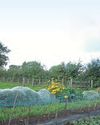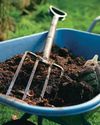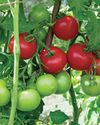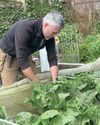
Ladybirds are well known to gardeners as the number one organic means of aphid control. Our most common ladybird, the seven-spot, can eat around 5000 aphids in its short life. But our relationship with ladybirds begins long before we have any conception of biological control or beneficial predators. Ladybirds are among some of the first creatures we encounter as children; whether on the cover of our first Ladybird book or out in the garden, ladybirds are instantly recognisable. Or are they? Ladybirds are, in fact, highly variable; beyond the usual red and black lies a spectrum of colours and patterns; some are yellow and black, some are cream and brown, some have 24 spots, some have none, some are fairly hairy and some are really very hairy. What's more, the famous fact you were told about them as a child - that you can tell how old a ladybird is by counting the number of spots it has - is complete bunk. Ladybirds live for up to a year, sometimes less, so if you are ageing your ladybirds this way, you will almost always be wrong. Thanks, Dad.
DAZZLING DIVERSITY
Counting spots won't help you to age a ladybird; nor, often, will it help you to identify it. Of the 46 species of ladybird in the UK, 26 of these are classed as 'conspicuous' ladybirds. These are the ladybirds we commonly recognise as such, and included with these are the species we often encounter in gardens. You can identify ladybirds by looking at the colour of the elytra, or wing case, the colour of their legs and undercarriage, the shape and colour of their spots and their general size.
Bu hikaye Kitchen Garden dergisinin February 2024 sayısından alınmıştır.
Start your 7-day Magzter GOLD free trial to access thousands of curated premium stories, and 9,000+ magazines and newspapers.
Already a subscriber ? Giriş Yap
Bu hikaye Kitchen Garden dergisinin February 2024 sayısından alınmıştır.
Start your 7-day Magzter GOLD free trial to access thousands of curated premium stories, and 9,000+ magazines and newspapers.
Already a subscriber? Giriş Yap

SEPTEMBER SPECIALS
This month, with sweetcorn, figs and blackberries on the menu, Anna Cairns Pettigrew is not only serving up something sweet and something savoury, but all things scrumptious

FLAVOURSOME FRUIT AUTUMN RASPBERRIES
September - is it late summer or the start of autumn? David Patch ponders the question and says whatever the season, it's time to harvest autumn raspberries

SOW GREEN THIS AUTUMN
Covering the soil with a green manure in winter offers many benefits and this is a good time to sow hardy types, says KG editor Steve Ott

A HISTORICAL HAVEN OF FRUIT AND FLOWERS
KG's Martin Fish takes time out from his own plot to visit a walled garden in Lincolnshire which has been home to the same family for more than 400 years

RESTORING THE BALANCE
The phrase regenerative gardening is often heard in gardening circles, but what is it? Can it help you to grow better veg? Ecologist Becky Searle thinks so, and tells us why

WASTE NOT, WANT NOT
Garden Organic's Anton Rosenfeld shares his expertise on using compost made from green bin collections with handy tips on getting the right consistency and quality

Celebrating Organic September!
In this special section we bring you four great features aimed at improving your crops and allowing nature to thrive

SEEING RED
Do your tomatoes have a habit of remaining stubbornly green? Or perhaps you're lucky to enjoy lots of lovely fruits - just all at once. Either way, Benedict Vanheems is here with some top tips to ripen and process the nation's favourite summer staple

NEW KIDS ON THE BROCCOLI!
Rob Smith is talking broccoli this month with a review of the different types available and suggestions for some exciting new varieties to try

A NEW kitchen garden
Martin Fish is getting down to plenty of picking and planting on the garden veg plot, while Jill is rustling up something pepper-licking good!